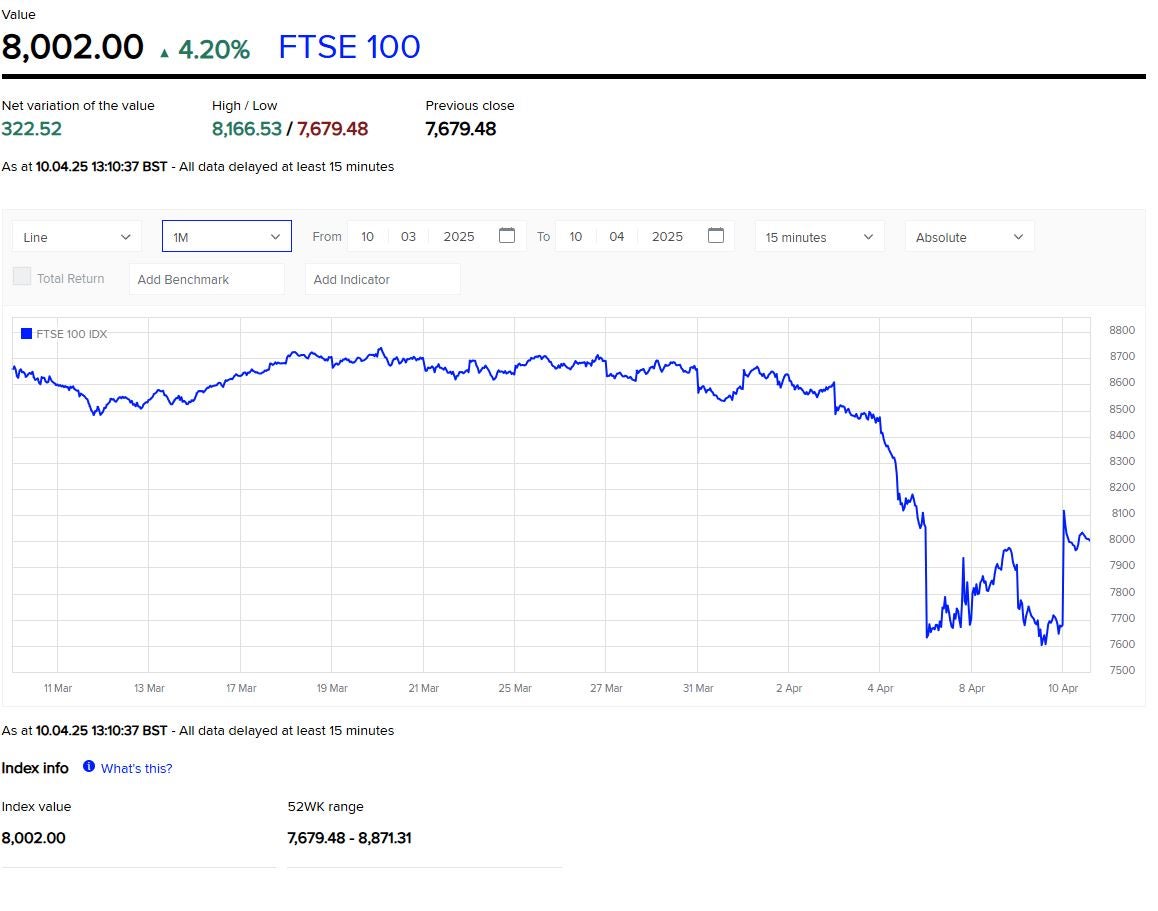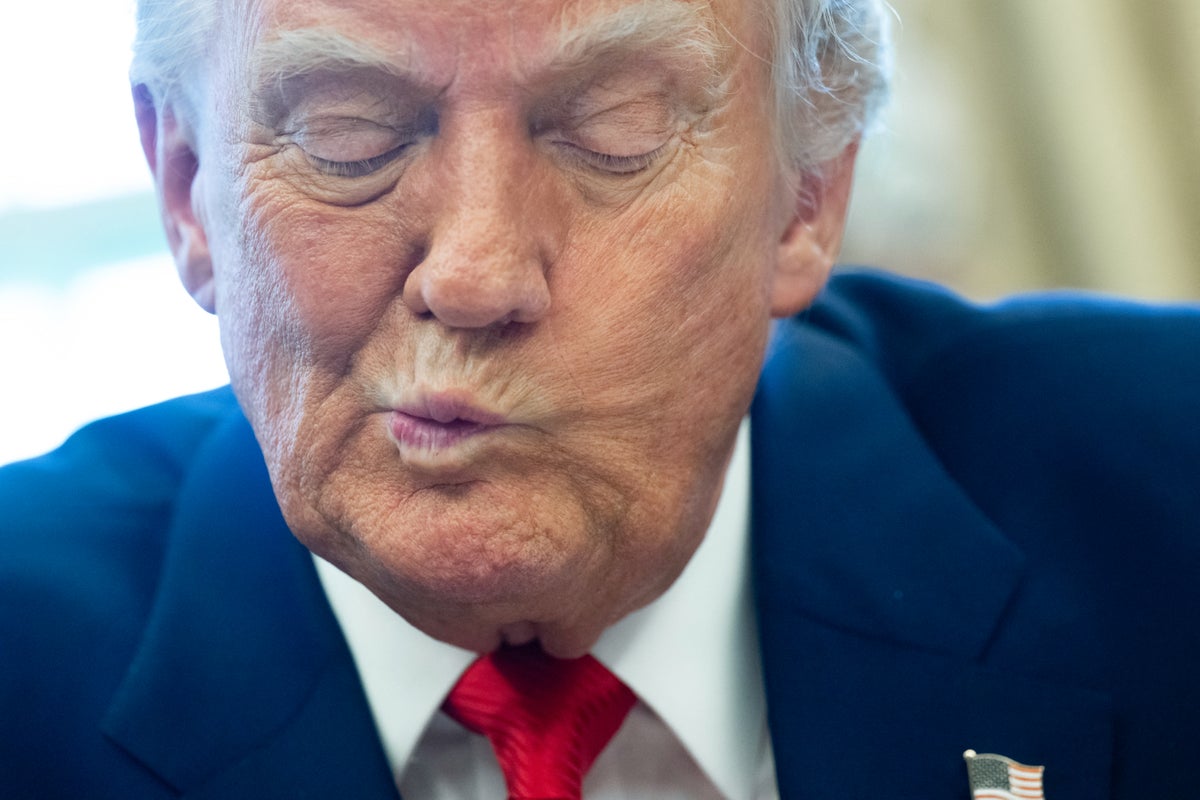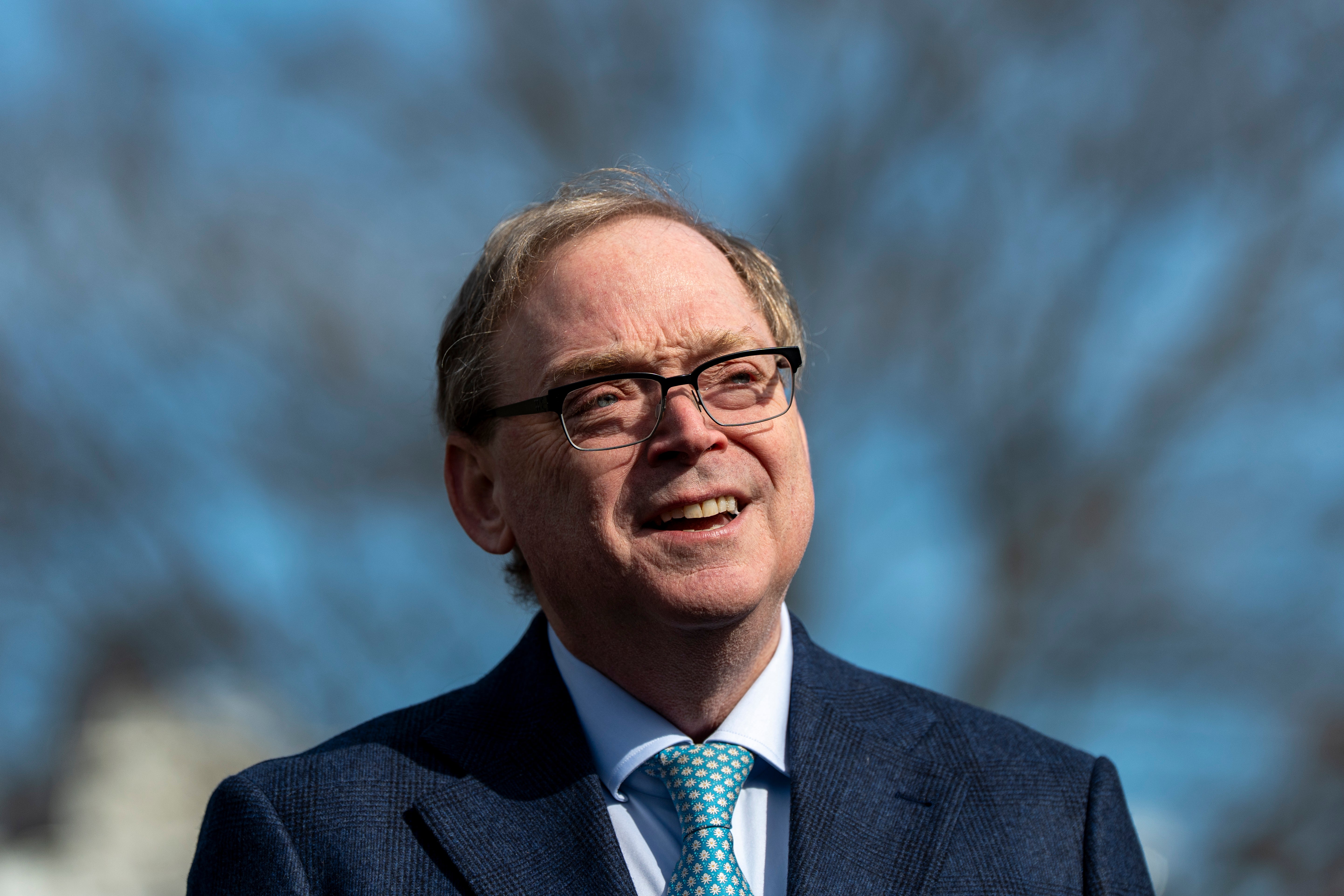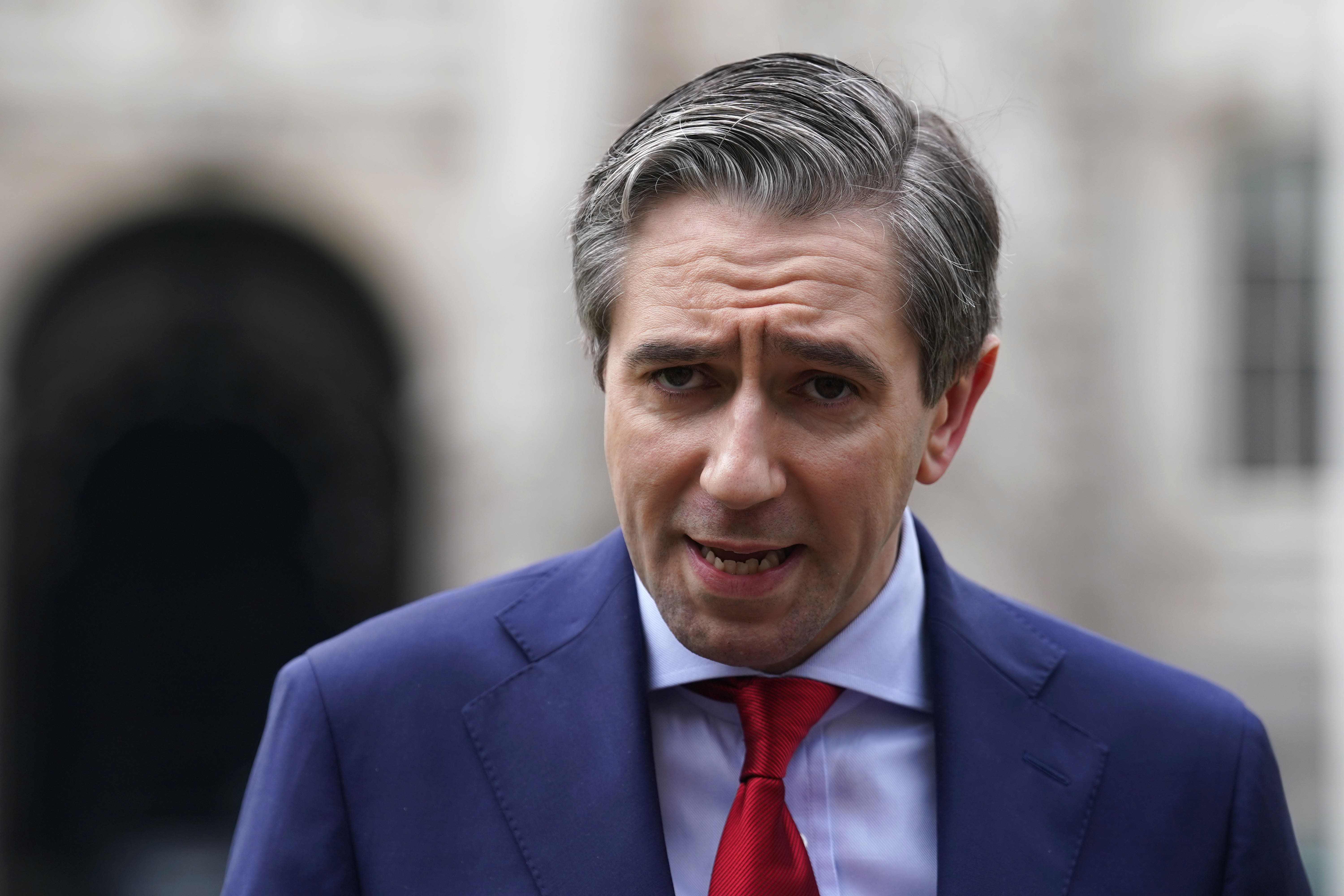Tariffs stay: EU pauses counter-tariffs on US items for 90 days however warns Trump over commerce deal
The EU has put its retaliatory measures against the US on hold for 90 days but issued a warning to Donald Trump over a trade deal.
European Commission President Ursula von der Leyen made the announcement today after the US president announced a 90-day freeze on the hefty tariffs he had imposed on dozens of countries.
She said in a social media post: “We want to give negotiations a chance. While finalising the adoption of the EU countermeasures that saw strong support from our member states, we will put them on hold for 90 days.”
A relief rally washed over battered global stock markets after Mr Trump’s humiliating U-turn, the FTSE-100 soaring by more than 6 per cent shortly after trading began.
However, Mr Trump ratcheted up the pressure on China, immediately hiking the tariff on Chinese imports to 125 per cent from the 104 per cent level that kicked in on Wednesday.
Beijing slapped 84 per cent tariffs on US imports in return, and has now hinted at further counter-measures.
Meanwhile, the US is considering offers from 15 countries on tariff agreements and is close to deals with some, White House economic adviser Kevin Hassett said.
US close to deals with up to 15 countries, says Trump aide
The United States is considering offers from 15 countries on tariff agreements and is close to deals with some of them, White House economic adviser Kevin Hassett says.
The US Trade Representative has said around 15 countries have made explicit offers that “we’re studying and considering and deciding whether they’re good enough to present the president,” Mr Hassett told reporters at the White House.
He said principals in the administration’s trade policy would meet later today to “make sure that the countries that are most important for getting this to the finish line are the countries that we bring in first”.
He said he expected a lot of movement on trade deals in the next three or four weeks. “This is a really, really fast process now that’s not beginning today or yesterday. It began long before,” he said.
“There’s a big inventory of deals that are right close to the finish line,” he told CNBC.
Global shares rise and bond sell-off eases
Global shares surged and a manic bond sell-off has eased.
“You’ve had a relief rally after the realisation that market pressure is something that resonates with the US president,” said George Lagarias, chief economist at Forvis Mazars.
European shares pushed higher today. The pan-continental STOXX 600 index was last up 5.3%, on track for its biggest one-day gain since March 2020.
Major indexes in London, Paris and Frankfurt were up between 4.6% and 5.7%.
In Asia, Japan’s Nikkei advanced more than 9%, while a broader gauge of Asia-Pacific stocks excluding Japan rose 4.5%.

German economy to stagnate even if Trump scraps ‘reciprocal’ tariffs, say forecasters
German economic institutes on Thursday cut their growth forecast for this year to 0.1 per cent from the 0.8 per cent expected in September, taking into consideration initial US tariffs on steel, aluminium and cars, confirming an earlier Reuters report.
Exports-dependent Germany is the only G7 economy that has contracted for the last two years.
The further “reciprocal” tariffs announced by US President Donald Trump on 2 April and suspended on Wednesday could still deal a major blow to Europe’s biggest economy, the institutes said, possibly “doubling the negative effects”.
This could put Germany on track for a third year of recession for the first time in post-war history.
Trump’s “aggressive trade policy [is] keeping the global economy on tenterhooks,” said Klaus Weyerstrass of the Vienna-based research institute IHS, which contributed to the forecast.
“The additional trade barriers are a significant burden on the global economy … especially because of their unpredictability,” he said.
“Changes to tariffs can occur practically daily, which has increased economic policy uncertainty to an unprecedented degree.”
Comment: Tariffgate – How Trump’s trade war blew up in his face
When, in 1974, President Richard Nixon was forced to resign after lying over a break-in involving planting listening devices at his Democrat rivals’ Watergate Hotel HQ during his re-election campaign, it became the biggest scandal in political history. Now, Donald Trump has found himself in the middle of a political storm that could prove as damaging: Tariffgate.
As markets opened on Wednesday, Trump posted on his TruthSocial platform: “THIS IS A GREAT TIME TO BUY!!!” Hours later, he issued an abrupt U-turn on the reciprocal tariffs he announced on his “Liberation Day” at the start of the month, declaring a “90-day pause” on tariffs for all countries except China.
Markets duly surged – as did social media, with accusations that the president’s “art of the deal” was, in fact, a reverse “pump and dump” whereby stock prices were hammered down and then bought before they rose. The Democrats are calling for an investigation into insider trading. Even Trump himself seemed muddled over when he decided to make this change, telling reporters in the same sentence that it was “over the last few days” and “fairly early this morning”.
Simon Walters writes:

Tariffgate: How Trump’s trade war blew up in his face
Sweden’s economic growth will be hit by tariffs, finance minister says
Sweden’s economic growth will be negatively affected by the international conflict over trade tariffs, the country’s finance minister Elisabeth Svantesson has said.
“It’s a given that the growth outlook must be revised down when the next forecast is presented,” Svantesson told reporters after a meeting between government ministers, companies and labour unions on Thursday.
Bond market may have contributed to Trump’s U-turn but ‘did not cause panic move’, Hassett insists
The bond market may have contributed to Donald Trump’s humiliating U-turn on tariffs, White House economic adviser Kevin Hassett has admitted.
However, in the interview with CNBC, Mr Hassett insisted it “did not cause a panic move”.
All countries should still expect to face 10% tariff, confirms White House economic adviser
All countries will still face what Donald Trump has called his “baseline” 10 per cent tariff, White House economic adviser Kevin Hassett has confirmed after the US President paused some of the duties.
When asked in an interview with CNBC if tariffs will be permanent, Mr Hassett responded: “Everyone expects 10 per cent tariffs to be the baseline.”

US close to trade deals with trading partners, White House’s Hassett says
The US is talking to trading partners and is close to reaching agreements with some on tariffs, White House economic adviser Kevin Hassett has said after President Donald Trump paused some of the duties.
“There’s a big inventory of deals that are right close to the finish line,” Hassett said in an interview with CNBC on Thursday.
Badenoch accuses Labour of making UK ‘more fragile’ in face of US tariffs
Kemi Badenoch has accused the Labour Government’s of making decisions since entering office that have “made us more fragile” in the face of US global tariffs.
“The biggest thing that Keir Starmer could do right now to make a difference is to get on with US-UK trade deal,” the Tory leader told the BBC.
She said “making sure we get a deal that brings new benefits to the UK, not just make concessions to take us back to where we were last week” was vital.
“(We) absolutely must be cool and calm when issues of trade come up,” Ms Badenoch said during a visit to Lancashire.
“It is about power, it is about our global relationships, it is about shaping the world.
“We need to be very careful not to just lurch into decision-making, but that requires having plans in place and knowing where you want to go.
“What we’re seeing right now is that Labour is learning on the job. I am worried that a lot of the mistakes that they’ve made have made us less able to weather the storm of tariffs.”
She said this included policies such as the rise in employer national insurance, changes to inheritance tax for farmers and means-testing the winter fuel allowance for pensioners.
“All of those things have made us more fragile,” Ms Badenoch said.

EU-US negotiations ‘likely, Ireland’s deputy premier says
Negotiation with the US is “likely”, Ireland’s deputy premier has said, after President Donald Trump announced a 90-day pause in certain sweeping tariffs.
Simon Harris met with US commerce secretary Howard Lutnick, a key critic of Irish policies within the Trump administration, in Washington DC on Wednesday.
The engagement came after Mr Trump said he would be delaying tariffs on most nations for 90 days while raising his tax rate on Chinese imports to 125 per cent.
The US had announced a 20 per cent tariff for the EU, which would have applied to Ireland.
The precise details of the pause were not immediately clear, but the US treasury secretary has said Mr Trump will keep a 10 per cent baseline tariff on most countries.
On Thursday, Mr Harris said he had debriefed EU trade commissioner Maros Sefcovic on his engagement with Mr Lutnick.
In a statement, he said: “It has been my consistent position and the consistent position of the Irish Government and the European Union that we need to get into substantive, calm, measured dialogue with the United States.
“It has always been our preference that would have happened before tariff announcements. Clearly that was not the position of the United States.
“However, after my discussions yesterday, it is now clear to me that such engagement and negotiation is likely.”



